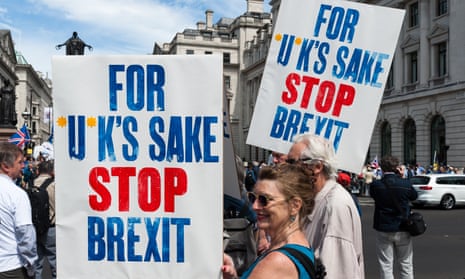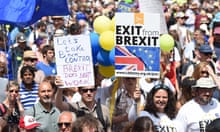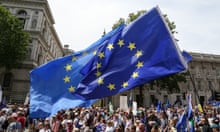Thirty-five years ago, David Anderson marched with his father in protest against Britain joining the common market. Yesterday, he travelled down from Rugby to stand beside his daughter and call for Britain to stay inside the European Union.
“I’ve gone full circle,” he said. “I think it’s so important for this generation, and the one after them. The referendum was a massive decision and people were ill-informed. They were lied to.”
Anderson, 53, and his daughter were far from alone. An estimated 100,000 people from all corners of the country thronged the streets of central London – from parents with babies a few weeks old to protesters in their 80s, from demo veterans to people on their first protest – to give a powerful show of European solidarity.
Officially they marched to demand a people’s vote, a second referendum on whatever terms the government agrees for leaving the EU. But for many, the march was simply a chance to show their anger and frustration, not just at the Brexit vote two years ago, but the political confusion that has followed.
“The north-east is one of the areas that stands to lose the most. But it’s not just us who will be harmed, it’s the whole country,” said Bob Heyman, who had travelled down from Newcastle with his wife, Ruth, to join the protest. “Neither of us are politically active, but this has just got us going. We really feel it’s the country’s future at stake.”
The crowd bridged deep political divides, with Conservatives marching beside Labour and Liberal Democrat supporters. Their chants – “Where’s Jeremy Corbyn?” bellowed repeatedly around Parliament Square – would not have made comfortable hearing for any of the main political parties.
Nicolas Maclean, a former adviser to Margaret Thatcher, marched with a group of about a dozen men and women brandishing “Tories against Brexit” placards. “She would be turning in her grave,” he said. “She said one of her greatest achievements in Europe was Britain taking the lead in setting up the single market and now some people in government want us to leave. It is an absolute disaster.”
Richard Stanely, a foster carer from Gloucester, said he worried about more cuts to services for young people, already pared to the bone after years of austerity policies. “Brexit is only going to make things worse.”
The march threaded through central London, and culminated in a rally at Parliament Square, with speeches from politicians including Vince Cable, the Liberal Democrats’ leader, who said: “We go on this march with a simple message: Brexit is not inevitable.”
The Green party co-leader Caroline Lucas said the march was a defence of the rights of Europeans in Britain, and Britons in Europe. “We are here to defend your rights and to defend free movement. Friends, what a wonderful gift it is, what a precious gift it is to be able to travel and to work and to study and to live and to love in 27 other countries. We should be celebrating freedom of movement not apologising for it,” she said.
Tony Robinson, the actor, said he attended as he had a “deep and abiding love for my country”. “It’s an old-fashioned and embarrassing word but I am a patriot,” he declared. “I am deeply offended that that word has been hijacked by a few reactionary colonialists over there [the Houses of Parliament] who peddle the fantasy of a UK that never existed except perhaps in the imaginations of their nannies and parlour maids.”
Many of those who turned out said that freedom of movement defined their lives. Hazel Bergiel, who is British, had come from her home in Chevreuse in the Île-de-France region near Paris to take part.
“I’ve lived in France for the last 35 years and I wouldn’t have voted to leave but I was denied a vote,” she said. “I’m very much anti-Brexit, but I’m still very much British. I only have one passport even though I live there and this is why I’m here, really – to support the movement.”
The march was a sea of flags – the EU’s circle of stars waved beside or superimposed on the Scottish saltire, and other countries of the union, or held up proudly beside a union jack.
“I hope the Brexit decision could be overturned, although I’m not really sure it’s possible,” said Maxine Roessler, a German at the march with her husband Chiufan Lee, five-year-old son and newborn daughter. Their faces were painted with the flags of the EU, her native Germany and their adopted home in Britain, where the family has lived for over a decade and plans to stay despite Brexit.
“I’ve applied for British citizenship,” said Roessler. “It was not a decision I took lightly, because to some extent, after the vote, I felt not wanted.”
Police on foot, in riot vans in the back streets and in helicopters were on standby in case of a clash between the People’s Vote march and a march starting less than two miles away at Victoria station, which had a heavy presence of far-right activists. A much smaller crowd, a few thousand strong at its peak, turned out for that protest, with Ukip flags flying next to posters for far-right groups including the White Pendragons.
Many of those marching seemed inspired by the movement behind Donald Trump in America, wearing “Make Britain Great Again” hats that echo his slogan, and one woman even wearing a rhinestone badge spelling out Trump. Pro-Brexit slogans mixed with chants of “Free Tommy Robinson”, the far-right activist whose support group had galvanised many of the day’s marchers.
“The government is trying to swindle us out of our Brexit,” said Ashley Jarrett, a hydraulic engineer who said he had come with a group of other Robinson supporters.
But there was no doubt which march would be remembered – both for its rambunctious slogans and for a quiet sense of outrage. Holding a placard urging the government to “save the economy”, Ed de Mesquita, a Tory Remainer, said he could hardly read the Telegraph any more. “Very often I find it difficult to get through an article. Even when Airbus says it’s threatening to close down some of its operations, they say you are moaning. This is the phony war. [Brexit] hasn’t happened. We haven’t left the EU yet. When it gets close the City, many manufacturers are going to leave.
“It’s not going to be OK. I tell you what is the worst thing, it’s the legacy we are going to leave the young people.”








Comments (…)
Sign in or create your Guardian account to join the discussion